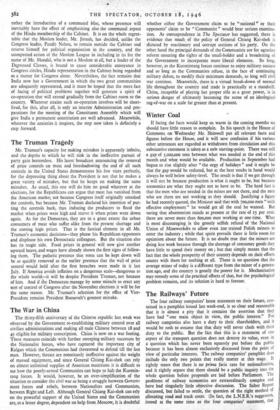The War in China
The thirty-fifth anniversary of the Chinese republic last.week was observed by the Government re-establishing military control over all civilian administrations and making all male Chinese between i8 and 45 eligible for military conscription. China is now on a war footing. These measures coincide with further sweeping military successes by the Nationalist forces, who have captured the important city of Kalgan which the Communists had threatened to defend till the last man. However, threats are notoriously ineffective against the weight of massed equipment, and since General Chiang Kai-shek can rely on almost unlimited supplies of American munitions it is difficult to see how the poorly-armed Communists can hope to halt the Kuomin- tang forces. It would, however, be an over-simplification of the situation to consider the civil war as being a struggle between Govern- ment forces and rebels, between Nationalists and Communists, between Right and Left. Although General Chiang Kai-shek can rely on the powerful support of the United States and the Communists are, to a lesser degree, dependent on help from,Moscow, it is doubtful whether either the Government claim to be " national " or their opponents' claim to be " Communist 'would bear serious examina- tion. As correspondence in The Spectator has suggested, there is evidence that much, of the policy of General Chiang Kai-shek is ' dictated by reactionary and corrupt sections of his party. On the other hand the principal demands of the Communists are for agrarian reform ensuring the rights of the small-holder and a broadening of the Government to incorporate more liberal elements. So long, however, as the Kuomintang forces continue to enjoy military success and so long as the Communists refuse, in the face of continuing military defeat, to modify their minimum demands, so long will civil war continue. Meanwhile,--there is a virtual break-down of normal life throughout the country and trade is practically at a standstill. China, incapable of playing her proper role as a great power, is in serious danger of ultimately becoming the scene of an ideological tug-of-war on a scale far greater than at present.






























 Previous page
Previous page